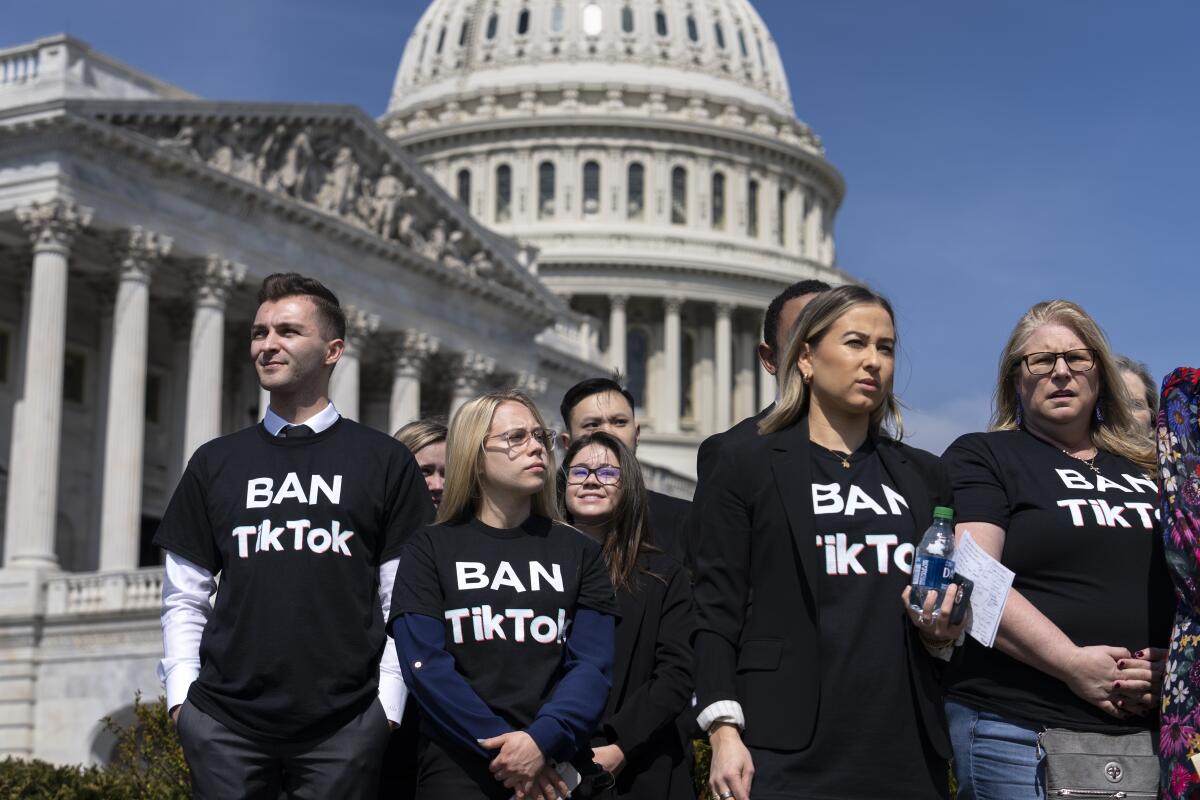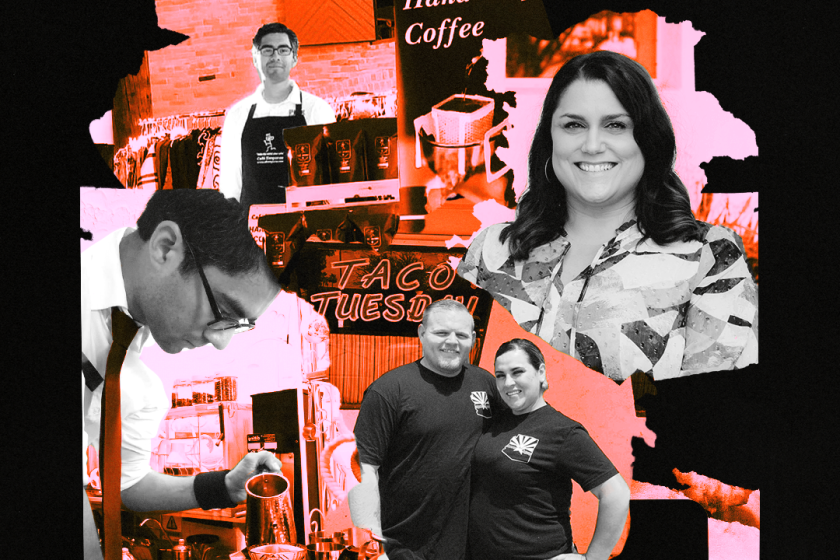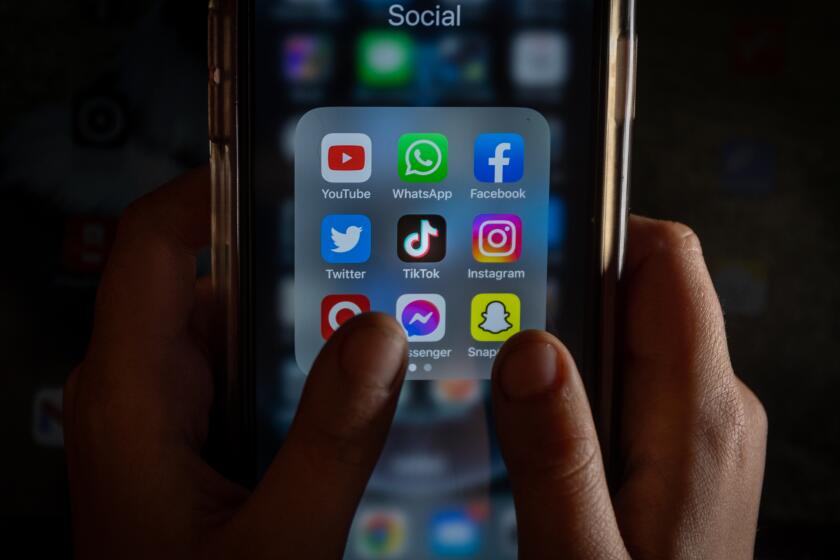L.A. influencers, businesses live or die on TikTok’s algorithm. Now they fear for the future

- Share via
Brandon Hurst has built a loyal social media following and a growing business selling plants on TikTok, where a mysterious algorithm combined with the right content can let users amass thousands of followers.
Hurst, who’s based in the San Fernando Valley, sold 20,000 plants in three years while running his business on Instagram. After expanding the business he launched in 2020 to TikTok Shop, an e-commerce platform integrated into the popular social media app, he sold 57,000 plants in 2023.
He now conducts business entirely on TikTok and relies on its sales as his sole source of income. Hurst, 30, declined to say how much he makes.
Hurst also posts content about plant care for a 186,000-person following on TikTok. He’s one of thousands of content creators who engage with an audience on the app and make money doing it — whether by selling products or partnering with brands.
But Hurst, along with many other creators and influencers, is now wondering whether Washington could threaten the progress he’s made with his business.
After President Biden signed a bill into law that would ban the Chinese-owned app in the U.S. unless it is sold to an American company, social media experts said the economic effects would extend beyond individual creators such as Hurst.
The popular short-video app says a federal agency has said it will be banned in the United States unless its Chinese owners sell their shares. Not surprisingly, users are pushing back.
TikTok has advantages that set it apart from other platforms such as Instagram and Snapchat, Hurst and other creators said.
“What makes TikTok special is the algorithm,” Hurst said, noting that if TikTok’s owners sell the app, the algorithm could change.
As with other social networks, TikTok uses a secret algorithm to determine which videos to show to each user, based on what they’ve seen before and with whom they have interacted. What sets it apart is the videos are usually short, informal and designed to entertain, and many spark conversations among creators.
Many small businesses prefer TikTok because of its informality — they don’t need a big production budget to showcase their products or services. They just need a good hook to grab viewers, and once they’ve gone viral a time or two and established their niche, TikTok will bring the viewers to them.
A ban on TikTok would have cascading effects — especially in Los Angeles, where so many influencers live and work. The Hollywood apartment complex 1600 Vine, for example, is considered by many to be a headquarters for content creators.
That address isn’t the only hub for TikTok stars. Another group lives in a Beverly Hills home dubbed the Clubhouse. If TikTok is banned in the U.S., many creators would lose large portions of their business, they said.
But a sale doesn’t solve every problem either. Some players are already lining up to buy the app even though it’s not yet for sale. And creators such as the Clubhouse residents, who make content as their full-time job, fear a new TikTok ownership could make it harder to attract an audience.
Any ban is expected to face legal challenges and delays, and TikTok executives have said there will be no immediate effect on the app.
While the legislation would have profound impacts across the tech, political, entertainment, media and marketing worlds, music may be hit especially hard.
Roughly 7 million small-business owners and 1 million influencers rely on TikTok for their livelihoods, according to Rory Cutaia, chief executive of Verb Technology, which owns a livestream social media shopping platform that has partnered with TikTok Shop.
The platform Market.Live helps small-business owners launch on TikTok, where they also often post videos about their products. TikTok Shop receives around 6,000 applications from small businesses each day, Cutaia said.
Banning TikTok would send ripple effects through the economy because it’s become a primary platform for emerging companies, he said.
“You’re probably talking about billions of dollars that would be removed from the economy,” Cutaia said. “The entire world of retail has changed completely. Today, you need to be distributing your products through social media.”

Adam Sommers, who owns Willow Boutique in Cincinnati, Ohio, with Chelsea Sommers, said TikTok leveled the playing field for small businesses. His was one of the first to sell merchandise on TikTok Shop.
“Everybody had an opportunity to become the next giant in their industry,” Sommers said. “A lot of people have scaled probably beyond their wildest dreams.”
Influencers don’t need to own a business to make money on TikTok, one creator said. They also don’t need to have huge followings to make significant profits, according to Denise Butler, chief operating officer at Verb Technology.
“TikTok very uniquely sets up a content creator to build community and provides amazing exposure,” said Payton Reed, a lifestyle blogger based in Memphis, Tenn., with around 16,000 followers. “When I first started blogging and creating content, I didn’t realize that it could eventually turn into a career.”
Reed makes money sharing links to other products. She was able to help support her husband financially through medical school with her content creator income, she said.
For small-business owners, TikTok Shop makes it “frictionless” to sell and buy products on the app, Butler said. Users can shop while watching a relevant video, interact with others who have purchased the product and complete the purchase without leaving the app.
Latinx small-business owners say a TikTok ban would cost them a valuable marketing platform — one that has had a tremendous impact on their ventures.
Although some say TikTok is superior to other platforms for its e-commerce functionality, not everyone relies solely on the app.
Adam Waheed, a sketch-comedy content creator based in Los Angeles, said it’s important to have income from more than one platform. He made around $11 million last year across his social media platforms, including Instagram, YouTube, Snapchat and Facebook.
“We’ve worked so hard to build these platforms,” Waheed said. “I think for certain creators who rely more on TikTok, it’s going to be much more of an issue,” he said of the potential ban.
TikTok users in L.A. include small-business owners, content creators and everyday users who can engage with millions of personalities and products. The app is its own local economy, and a ban would leave a gaping hole, creators said.
According to a study from TikTok and Oxford Economics, 890,000 businesses and 16 million people actively use TikTok in California. Forty percent of small to midsize businesses in the state said TikTok was crucial to their business.
TikTok also released national economic data showing the app drove $15 billion in revenue for small businesses.
“More than half of small-business owners say TikTok allows them to connect with customers they can’t reach anywhere else,” the report said.
As the Biden administration weighs a ban on the app, many budding entrepreneurs fear losing a tool that has helped them build a robust customer base.
Content creators and the companies that work with them aren’t the only ones concerned about a potential TikTok ban. Sen. Laphonza Butler (D-Calif.) recently wrote a letter to Biden urging him to consider how a ban would affect laborers.
“Approximately 8,000 people work for TikTok in the United States, concentrated in California and New York,” the letter said. “Their employment and the livelihoods of their families hang in the balance.”
The senator said a ban would harm small-business owners, contractors and other workers, including janitors and servers who help businesses run.
“We need to be taking the time to consider the broader economic impacts,” she said in an interview with The Times. “There are thousands of workers who I think are not being considered.”
More to Read
Sign up for Essential California
The most important California stories and recommendations in your inbox every morning.
You may occasionally receive promotional content from the Los Angeles Times.















